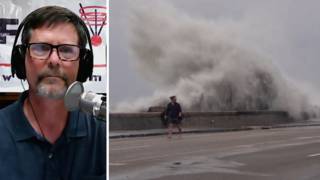
In the Caribbean, Hurricane Maria struck the U.S. territory of Puerto Rico this morning as a major Category 4 storm—the most powerful hurricane to make landfall there since 1928. The landfall on Puerto Rico came after Maria lashed the U.S. Virgin Islands and devastated the island of Dominica, causing what the country’s prime minister called “mind-boggling” devastation. For more, we speak with Democracy Now! co-host Juan González.
Transcript
AMY GOODMAN: This is Democracy Now!, democracynow.org, The War and Peace Report, as we turn now to look at Hurricane Maria, which just made landfall in Puerto Rico this morning as a Category 4 storm, just down from Category 5 hurricane. Puerto Rico’s Governor Ricardo Roselló has called Maria, quote, “the biggest and potentially most catastrophic hurricane to hit Puerto Rico in a century.” This is the Puerto Rican resident Grisele Cruz.
GRISELE CRUZ: [translated] This is going to be catastrophic for our island. And at this point, on many parts of the island, we’re without power because of the first storm that came through. That was Irma. We’re without water in many districts. Can you imagine this now? Catastrophic. We’re going to be, I think, without services for a long time.
AMY GOODMAN: Hurricane Maria has already killed at least two people on the island of Guadeloupe and devastated the island of Dominica. Juan, your sister is in San Juan right now?
JUAN GONZÁLEZ: Oh, no, she’s in Cayey, in the center of the island, yes. We spoke to her last night, and she was preparing for the hurricane. But it entered around—I guess around 5:00 this morning. And it came, actually, in an unusual path. It came to Puerto Rico from the south, through Yabucoa, on the southeast part of the island, and apparently has gone right through the center of the island. Most hurricanes that hit Puerto Rico come from the east and come in through Fajardo. But this one is a path that actually could create the most destruction.
Already, I think, 88 percent of the island has lost electricity, from what I understand, because there’s already a very fragile electrical grid, that sustained a big hit during Hurricane Irma. And so, now we’re seeing as much as 88 percent of the people have already lost their electricity.
The question is, though, the rains. In Puerto Rico, the big problem is always, with hurricanes, the massive rainfall creates these huge flash floods. And that’s when most people end up being killed. So, hopefully, this won’t happen. But I understand weather experts are talking about as much as 25 inches of rain in a very short period of time from this hurricane.
AMY GOODMAN: Do you know how many people now are in shelter? And did your sister just choose not to leave?
JUAN GONZÁLEZ: Well, I think that it’s only about—I understand, about 11,000 people are in shelters, which is a small number compared to the total population of 3.5 million of the island. Most people are battening down. You know, many of the houses have storm-proof windows, and they’re hoping to ride it out. But the problem is also the rains could also trigger mudslides, and many houses are built on the sides of hills. That’s always a problem.
AMY GOODMAN: I mean, people must be suffering such terrible PTSD, post-traumatic storm disorder, right? Because you have them already coping with Irma. It did not hit Puerto Rico as hard as it was expected, but everyone was terrified that it would. And, of course, it suffered some damage. And now you have this.
JUAN GONZÁLEZ: Right. And this is obviously a direct hit, whereas Irma sort of glanced the island and really didn’t go directly over it. So, yes, this is possibly the worst scenario. And, of course, the biggest hurricane ever that—in terms of damage to Puerto Rico, was San Ciriaco, back in 1899, when more than 3,000 people were killed in that hurricane. And the only other Category 5 hurricane was in 1928. So this is an unusual event even in an island that is prone to hurricanes.
AMY GOODMAN: Juan, thanks. And, of course, we’re going to continue to cover this, as well, as Hurricane Maria has made landfall in Puerto Rico as this broadcast takes place.
This is Democracy Now! When we come back, we go to Washington, D.C., the Republicans’ last-ditch effort to repeal and replace the Affordable Care Act. Stay with us.












Media Options